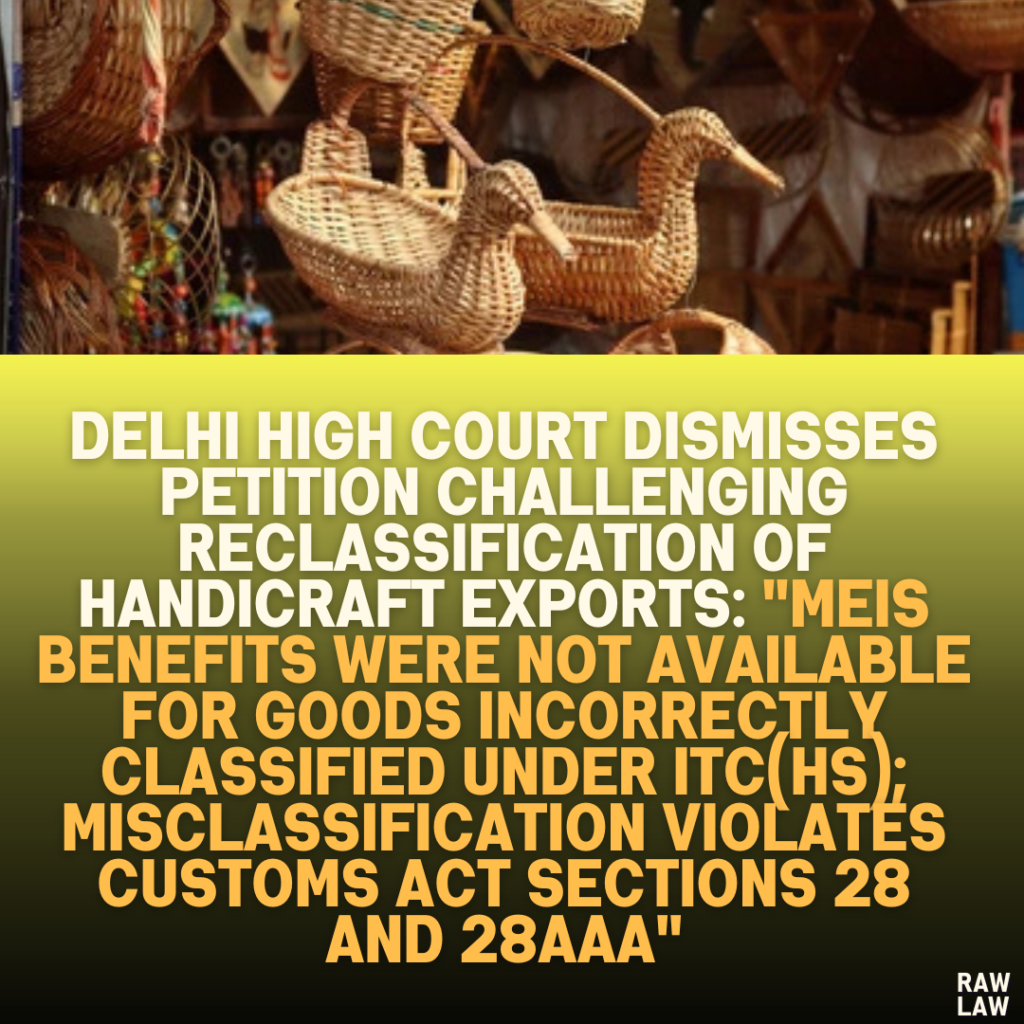Court’s Decision
The Delhi High Court rejected the petitions and affirmed the reclassification of exported goods by the Customs Department under CTH 6802, which invalidated the petitioners’ claim for MEIS benefits. The Court found that the petitioners had misclassified their goods under ITC(HS) Code 68159990 to avail higher export incentives under MEIS.
The Court held that:
- Misclassification for undue benefits violates the Customs Act, 1962.
- Actions taken under Sections 28(4) and 28AAA of the Customs Act were justified, allowing recovery of erroneously granted MEIS benefits.
2. Facts
The petitioners, exporters of stone and marble handicraft products, had been classifying their goods under ITC(HS) Code 68159990 since 1991. This code qualified their exports for higher MEIS benefits under the Foreign Trade Policy (FTP) 2015-2020.
Disputes arose when the Central Board of Indirect Taxes and Customs (CBIC) issued clarifications stating that such products should be classified under Customs Tariff Heading (CTH) 6802, which did not qualify for MEIS benefits.
Key points in the facts:
- Goods Exported: Handicrafts made of stone and marble.
- Period of Dispute: 2015-2020 under the MEIS.
- CBIC Intervention: A Public Notice in 2019 clarified the correct classification under CTH 6802, disqualifying the products for MEIS benefits.
- Audit Objection: Customs initiated recovery proceedings, claiming the exporters misclassified goods with the intent to gain higher benefits.
3. Issues
The Court addressed the following legal questions:
- Whether the petitioners correctly classified their exports under ITC(HS) 68159990.
- Whether the Customs Department’s recovery actions under Sections 28(4) and 28AAA were lawful.
- Whether the procedural safeguards (e.g., show-cause notices) were adhered to by the Customs Department.
- Whether the CBIC’s clarification and reclassification of the goods violated the petitioners’ rights.
4. Petitioner’s Arguments
The petitioners contended:
- Consistent Classification: The products were consistently classified under ITC(HS) Code 68159990 and approved by Customs since 1991.
- Validity of MEIS Benefits: The exporters acted in good faith based on previously accepted classifications, and the MEIS benefits were lawfully availed.
- CBIC’s Clarification is Arbitrary: The CBIC’s reclassification lacked detailed reasoning and was contrary to prior approvals.
- Violation of Natural Justice: The audit objections and recovery actions were initiated without a proper show-cause notice, depriving them of an opportunity to contest.
- Section 28AAA Applicability: Recovery under Section 28AAA requires proof of collusion or suppression, which was absent in this case.
5. Respondent’s Arguments
The Customs Department argued:
- Misclassification: The goods should have been classified under CTH 6802, per CBIC’s clarification, which excluded MEIS eligibility.
- Recovery Under Section 28AAA: The undue benefits were obtained through misclassification, allowing recovery under the Customs Act.
- Fair Procedure: Adequate notice and opportunity were provided to the petitioners during the audit and subsequent proceedings.
- CBIC’s Authority: The classification was clarified to ensure consistency and compliance with tariff regulations.
6. Analysis of the Law
The Court closely examined key legal provisions and precedents:
Sections 28 and 28AAA of the Customs Act
- Section 28(4) allows recovery of duties when misstatements or incorrect declarations are made.
- Section 28AAA specifically applies to cases where export benefits, such as duty scrips under MEIS, are obtained through collusion or suppression.
- The Court found that the petitioners’ classification of goods under ITC(HS) 68159990, despite CBIC’s clarification, amounted to misclassification, enabling recovery.
Foreign Trade Policy (FTP) 2015-2020
- MEIS benefits are linked to the accurate classification of exported goods under eligible ITC(HS) codes.
- The CBIC’s clarification ensured consistency in tariff interpretation and eliminated wrongful benefit claims.
Natural Justice and Procedural Fairness
- The Court held that while the petitioners alleged procedural lapses, they had sufficient opportunity to respond to audit objections and contest recovery demands.
7. Precedent Analysis
- Metal Forgings v. Union of India (2003): Emphasized the necessity of clear show-cause notices for recovery actions.
- Zuari Industries Ltd. v. Commissioner of Customs (2007): Held that essential certificates issued by the appropriate authority must be respected, but subject to regulatory compliance.
The Court found these precedents distinguishable, as the CBIC’s clarification and Customs’ actions were consistent with statutory provisions.
8. Court’s Reasoning
The Court reasoned:
- Misclassification Evident: The goods were incorrectly classified under ITC(HS) 68159990, contrary to CBIC’s clarification.
- Audit Validity: The Customs Department acted within its statutory powers to recover benefits wrongly claimed.
- Procedural Compliance: The audit objections and recovery demands provided adequate opportunity for the petitioners to contest.
- Section 28AAA Standards: While collusion or suppression was not explicitly alleged, the misclassification itself justified recovery under Section 28AAA.
9. Conclusion
The petitions were dismissed. The Court upheld the Customs Department’s actions, ruling that MEIS benefits were not available for goods incorrectly classified under ITC(HS) 68159990. The recovery of INR 1.23 crore from the petitioners was deemed lawful.
10. Implications
This judgment has significant implications:
- Exporters’ Compliance: Reinforces the importance of adhering to CBIC clarifications and accurate tariff classifications.
- Customs Authority: Affirms Customs’ powers to recover undue benefits and enforce tariff consistency.
- Legal Certainty: Provides clarity on the interplay between FTP policies and Customs Act provisions.




Pingback: Jammu & Kashmir High Court Directs Expeditious Payment of Compensation for Panchayat Land Acquired for Road Construction; "Collector Must Disburse Compensation Within Three Months" - Raw Law